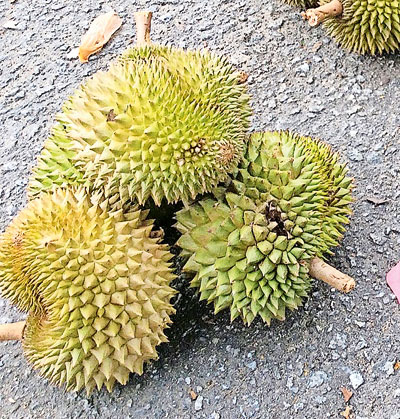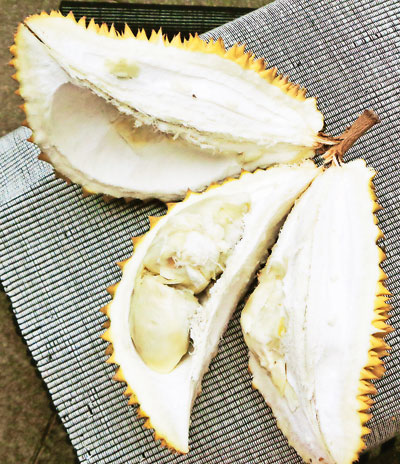If you can bear the smell, Durian is a must try
View(s):By Dr. Nirmala M. Pieris
Regarded as the ‘King of fruits’ in South East Asian countries, Durian has the most notorious and overpowering smell, but it is undoubtedly a most fascinating fruit. When you experience the distinctive and unusual intense odour of the fruit just once, you will never forget it. Bring home one fruit and your entire home will be engulfed with the penetrating aroma and it is not unusual for your neighbours to also know that you have the fruit.

Creamy goodness: The inside of the Durian
The powerful smell has been described in numerous ways as a combination of various substances, some of which are turpentine,compost, decayed onions, garlic, cabbage and rancid cheese. So why does the durian smell so strong, and why is it heavenly to some and disgusting to others? Studies on this dominant odour have revealed a chockful of strong, good and bad smelling chemical compounds, almost 50 of them. People who pick up good smells of compounds such as esters that smell fruity find it pleasing, while those who pick up the bad smells of compounds such as thiols that smell like garlic and rotten eggs can’t stand it. So it is all a matter of personal preference and those who love the fruit hardly notice the smell.
This formidable fruit has a green to yellow brown husk covered with large spikes enclosing smooth creamy white or yellowish bulbs in five compartments. The fruit that can weigh anything between 2 to 4 kg is ovoid to oblong or nearly round in shape. The seeds enclosed within the bulbs are quite large with a glossy red-brown seed coat.
Durian, Duriozibethinus in the family Malvaceae is tropical in origin and seasonal. In Sri Lanka, the fruits mature from about June to August. This is why you now see heaps of durians displayed by the road side and market places. Durians fall off the tree when ripe and some split into segments. They continue to ripen for 2 to 4 days and lose eating quality in 5 or 6 days. The pulp that is highly perishable, is neither acid, nor sweet, nor juicy, and is described as custardy and absolutely delicious, something like a concoction of ice cream, onions, spices, and bananas. A delightful combination indeed, so well worth trying if you have not done so already.
Most often the flesh is eaten off the ripe fruit. In some south-eastern countries it is used to flavour traditional dishes and candies. It is also used in cakes, desserts, cookies, tarts, ice-cream, milkshakes, smoothies, dodol and even as a filling for pancakes and to make durian chips. The ripe flesh is canned in syrup, dried and also converted to blocks of durian paste.Surprisingly, there is also a toothpaste flavoured with durian currently marketed for durian lovers.
Nutritional benefits
Durian has an impressive array of vitamins and minerals. It is rich in vitamins A, C and the B complex vitamins, thiamine (B1), riboflavin (B2), niacin (B3) and folic acid (B9) as well as the minerals, manganese, copper, iron, potassium and magnesium. It also contains the amino acid tryptophan. The fruit is high in calories and dietary fibre and low in sodium. Though it contains a relatively higher amount of fats among the fruits, it is free from saturated fats and cholesterol.
Keeps your body running well
Durian is an excellent source of B-complex vitamins; a rare feature for fruits. These vitamins play an important role in keeping our bodies running like well-oiled machines, helping convert food into fuel and allowing us to stay energised throughout the day. The simple sugars, glucose, fructose and sucrose in the fruit further replenish energy and revitalize the body instantly. The antioxidant vitamin-C helps develop resistance against infectious agents and scavenge harmful free radicals.
 Super source of minerals
Super source of minerals
From among the minerals in the fruit, manganese is an important trace mineral required for many vital functions, while copper and iron are essential for red blood cell formation. Potassium helps controls heart rate and blood pressure and can also help reduce fatigue and relieve mental stress and anxiety. Also all these minerals together with magnesium play an integral role in developing and sustaining bone strength.
High in fibre
Yet another benefit of the durian is its high fibre content. The fibre helps to reduce LDL cholesterol. So contrary to popular belief, you will not have a spike in cholesterol level after eating a durian. In fact, the fruit has good mono-unsaturated fats that can actually lower harmful cholesterol levels and moderate high blood pressure. The dietary fibre in the fruit is also a digestive aid and good bulk laxative, protecting colon mucous membrane by decreasing exposure time to toxins. It also helps bind and eliminate cancer-causing chemicals from the gut.
Slows aging
In traditional medicine, durian was hailed as a tool to battle aging and this was one of the main reasons to call it the ‘king of fruits’. The diverse antioxidant properties of the fruit stemming from its vitamin and chemical makeup, reduces free radicals in the body. So eat durian and feel, act and look much younger.
Natural sleep solution
The high level of the essential amino acid, tryptophan in the fruit plays a vital role in sleep initiation and soothes nervous irritability. Tryptophan metabolizes into serotonin and melatonin the two neurochemicals that induce sleep.
Aphrodisiac
Whether it is due to the chemicals in the fruit or its heady aroma or texture and intense flavour, durian puts people in the mood for love and intensifies sexual libido and stamina. It also reduces chances of infertility and increases sperm motility.
So there you are, durians are rich in many things and if you can get through the smell, enjoy the taste and its special character- after all it is available only for two to three months each year. But do consume in moderation especially if you are a diabetic or watching your waist line as it is rich in carbohydrates and calories as well.


